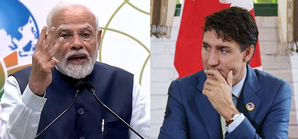America
Escalating Canada-India Tensions Viewed as Short-Term Advantage for Modi and Trudeau

October 16 :
The extraordinary expulsion of top diplomats from each country could have short-term political benefits for the prime ministers of India and Canada, according to commentators on October 15. As part of a larger campaign to persecute Indian dissidents in Canada, six Indian diplomats were expelled from the country on October 14 after being implicated in the killing of a Sikh separatist leader. As a form of retaliation, India demanded the departure of six Canadian ambassadors.
Despite the fact that the petty exchange sunk bilateral ties to an all-time low, it's doubtful that Narendra Modi and Justin Trudeau will be too bothered by it. Both heads of state are dealing with political difficulties during their third terms in office. According to analysts, Modi's reputation as a strong leader on national security could be enhanced by this move.
“I think people will see the government of India standing up to intimidation and coercive measures applied by a developed country,” said Harsh Vardhan Shringla, India’s former foreign secretary. "The public will strongly back Prime Minister Modi and the government." When Modi's Bhartiya Janata Party lost the majority in an unexpected election in June, it was a big defeat for him. As a result of his diminished strength, Modi must depend on his regional friends to establish a coalition administration.
Approximately 2% of Canada's population identifies as Sikh, making it the country with the largest concentration of Sikhs outside of Punjab. Protests in recent years seeking the creation of an independent country have infuriated the Indian government, which frequently accuses Canada of providing sanctuary to separatists. Think tank head for foreign policy at New Delhi's Observer Research Foundation, Harsh Pant, claimed that Modi benefited from Trudeau's increased focus on India.
People look up to him as a national leader who defends his country's borders and independence. He went on to say that this sums up why Modi's popularity will remain unshaken. The revelation deflected attention away from an alleged attempt by disgruntled lawmakers to pressure Trudeau into stepping down and allowing a new leader to assume leadership, which is problematic for Trudeau as his Liberal Party is significantly behind in the polls for a national election that is required to be conducted by October 2025.
"When the time is right, we can discuss party intrigue," he told reporters on Sunday when pressed for comment "Right now, this government and indeed all parliamentarians should be focused on standing up for Canada's sovereignty, standing against interference, and looking to be there to support Canadians in this difficult moment."
Trudeau relies on the backing of the left-leaning opposition parties in Canada to maintain his minority government, and the heads of those parties have publicly stated their support for the expulsions. A political science professor at Trent University in Peterborough named Cristine de Clercy, however, predicted that any boost for Trudeau would be temporary.
"You could say, yes, the short-term upside is to displace headlines," according to her. "The list of domestic issues that he has to address is so much longer and more complicated than this single incident in a faraway country." In recent years, the politically powerful Sikh community has supported many political parties, including the Liberals. While one leader expressed his approval of the expulsions, he did not anticipate that the conflict would have any bearing on internal politics. According to Moninder Singh, a representative of Sikh institutions in the province, the nonprofit B.C. Gurdwaras Council, this development demonstrates that the government is doing its responsibility by holding India accountable.



































